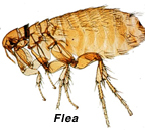
Part of your job as a pet owner will be protecting your family from the parasites that can plague your pets and make their lives (and yours) miserable.
Worms may lead to significant illness such as vomiting, diarrhoea and anaemia, or may lead to no obvious problems in the early stages. Many of the worms that pets get are transmissible to humans, particularly kids (who also often eat unusual things and may not effectively wash their hands). Even if your pet is treated for intestinal parasites, ensure your kids always wash their hands after playing with the dog or playing outside.
Make sure the wormer is safe to use – you may need to check with your Vet first.
FLEAS and ticks
Australian pet owners spend hundreds of dollars a year keeping their pet free of fleas and ticks, and with good reason. Fleas occur nationwide throughout the year and ticks are a pest right along the east coast, mostly during the warmer months.
Flea bites are irritating, but this is the least of your pet’s concerns. The consequences of flea infestation can be a lot worse. If your pet is allergic to flea saliva, one bite is enough to trigger a severe itch. He’ll scratch and bite at himself until his skin is red and traumatised and he has lost the hair over the affected area. Bacteria can infect his broken skin which makes the itching worse.
Because ticks drink your pet’s blood, a large number of them can cause anaemia. In fact, pets have died because of tick related blood loss.
There are actually 70 different tick species in Australia, but the tick we really worry about is the paralysis tick, found along the east coast from spring to autumn. There are also other types of ticks that parasitise dogs, cause anaemia and spread disease. These are more a problem in semi-rural areas.
Ticks can either attach directly onto your pet while walking near shrubs and bushes, or be carried into your yard or home on clothing, beach towels or wildlife. Paralysis ticks are common along the east coast of Australia in the warmer weather and require fortnightly prevention
Check with your Vet for the best prevention treatment.





